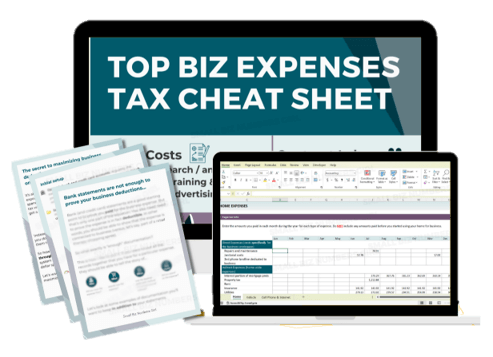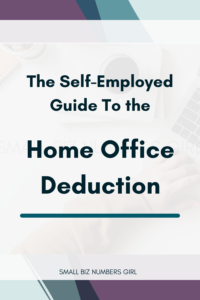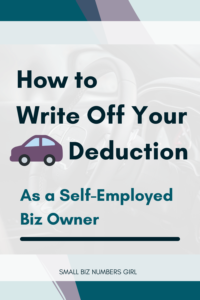Top 20 Business Expenses to Write Off for HUGE Tax Savings
As a self-employed biz owner, you’re DOUBLE CHARGED on your tax bill.
Once for income tax, which is the tax we all know and love (to hate). And once for self-employment tax–which is an entirely separate tax. This tax alone can clean out your pocket up to 15.3% of your profit.
And if there’s ONE thing in this entire world that can reduce both your income and self employment tax at the same time…
It’s your business deductions.
So you definitely wanna be squeezing out as much tax savings as possible out of all of those $$$ you spend on your business. And that really comes down to 3 basic things:
- Knowing what business expenses you should be writing off
- Taking the steps to get the most tax savings from these expenses
- Deducting these expenses safely and correctly, so you can stay on Uncle Sam’s good side
We’re of course gonna be focusing on #1 here. Because the biz owners who save the most taxes are the ones who expand their knowledge. So let’s dive into the 20 of the biggest business expenses that will help you shrink your tax bill. Shall we?
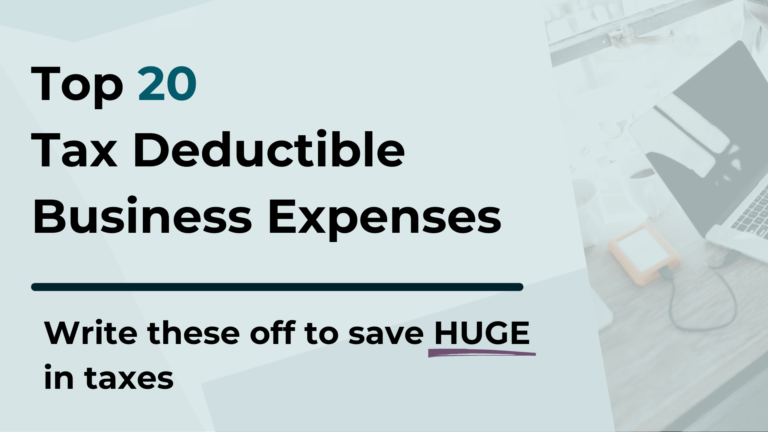
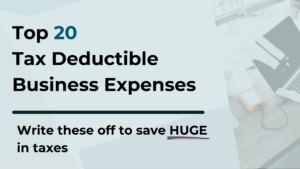
DISCLAIMER: The content provided is for informational purposes only. You should not construe any such information or other material as legal, tax, investment, financial, or other advice. Always consult with a professional.
1. Startup Costs
Startup costs are the expenses you fork out for your business even before it opens its doors. We’re talking from the time your business was just a spark of an idea, all the way through to when you “started the engine” of your biz operations.
You can deduct up to $5,000 of qualifying startup costs in the first year your business becomes operational. If your startup costs are greater than that first-year limit, then the additional amounts will be deducted evenly over the following 15 years (we call this Amortization).
📝Examples: market & industry research costs, consultation fees, supply stock, pre-opening employee wages & training, and pre-opening advertising & marketing.
BT Dubs: If you have more than $50,000 in startup costs, the amount you’re allowed to deduct your first year is reduced dollar for dollar that your startup costs are over $50,000.
2. Contract labor/Outside services
Even in business, no owner is an island. So we might choose to outsource some of the more general or non-core tasks to other service providers. This is referred to contract labor, or outside services. You can write off the payments for these types of services.
📝Examples: independent contractors, freelancers, virtual assistants & OBMs, graphic & web designers, brand & marketing photographers.
3. Legal and professional services
Along the same lines as contract labor and outside services are legal and professional services. The only actual difference here is that these are services that require specialized training and knowledge, and perhaps even certification. These professional services are definitely deductible business expenses.
📝Examples: attorneys, accountants, consultants.
With this “Self Employed Tax Savings Starter Kit”, you’ll get to know the top business deductions available to you as a self-employed biz owner, plus the steps to implement during the year so you can maximize your tax saving potential & slash your tax bill (while staying compliant and legit).
Snag your kit for only $9 (psst! it’s also a biz tax write off 🤫)
4. Advertising and marketing
Let’s face it, when you have a business, you gotta toot your own horn. And in today’s day and age, marketing comes in many different flavors.
Maybe your business thrives on online ads. Or perhaps you’re old school and prefer using printed materials. Or maybe you have your own unique way of putting your business out there. However, you’re doing it, you can deduct the costs to advertise, market, or in any way promote your business.
📝Examples: online ads (e.g., Google ads, FB ads), physical ad materials (e.g., flyers, posters, business cards), and promotional trinkets (e.g., pens, keychains).
5. Office expenses
I like to think of office expenses as the small but might deduction. Because these little things like pens, paper, and printer ink? Those add up. Big time. Because pretty much all businesses have back-end office and administrative tasks. And they’re seemingly never-ending.
So make sure you’re keeping track of all the office supplies and expenses you use in your business. Because in my experience working in business taxes, it’s usually one of the largest deductions on the tax return every year.
📝Examples: postage, writing materials, stationery & paper supplies, organizational supplies.
HOLD UP!: Office equipment is not typically considered an office expense, but rather a fixed asset. See top deduction #8 for more info.
6. Merchant/sales processing fees
If there was a cost I’ve heard business owners grumble about, it would be merchant processing fees. And trust, I get it. I’ve don it myself a few times. These are the giant chunk of fees you get charged when you allow your customers or clients to pay with a credit card or other 3rd party payment processor. And you’re pretty much being charged on like every. single. transaction. I don’t have to tell you that these fees can add snowball into a hefty chunk of change, so you’ll definitely want to include them in your business write offs.
When doing bookkeeping, record the fees and the actual sales amount separately, rather than just lumping them together and recording the net sale/deposit.
📝Examples: Stripe, Square, and Paypal fees.
7. Travel
Sometimes business might take you away from home. It may be for something like visiting an out-of-state client, a business conference, or a trade show. When a trip is primarily for business purposes, it is considered a business trip, and costs for these types of trips are tax deductible. Just a note, the travel must be at least 100 miles away from the place you normally do business.
Also, throwing in a little bit of “me time” into the trip is typically okay. It can still be considered a business trip as long as your itinerary remains primarily for business. Be sure not to pay for any of the personal costs from the business, and not to include them in any deductions.
📝Examples: airline tickets, baggage handling, lodging, ground transportation.
8. Depreciation
Some of your major business purchases like are a special type of expense, and need a little extra TLC when deducting. More specifically, I’m talking about fixed assets (aka capital expenditures). These are the stuff you buy for your business that is meant to be used for a long time, at least one year.
And because they are long-term items, you typically can’t deduct the cost for these fixed assets all at once. Instead, they are written off over a period of time. This is referred to as depreciation. Think of depreciation as the “wear and tear” from using the asset over time.
📝Examples: office equipment, furniture, machinery, and buildings/real property (but not land, which doesn’t depreciate).
But if you don’t wanna wait…there are special types of depreciation that allow you to deduct up to 100% of the cost of fixed assets the very first year you purchase them. These are the bonus depreciation and the section 179 deduction.
Keep in mind that for many business owners, speeding up depreciation may not be the best choice for their tax situation. Before taking special depreciation, you ABSOLUTELY should talk to your tax pro to see if this actually makes sense as part of your tax strategy.
9. Rent and lease
In some cases, it might make more financial sense for your business to rent or lease instead of buy. In these cases, you wouldn’t deduct the depreciation for the fixed assets. Since your business doesn’t own it, it’s not yours to depreciate. However, you can deduct any rental or lease payments for the property.
📝Examples: rent/lease payments for commercial real property (e.g., business office, storefronts), equipment, machinery.
10. Internet and tech expenses
Unless your business address is “30 Under-A-Rock”, chances are technology plays at least some part in your business. Heck! You’re probably racking up deductions just on internet services and tech alone! So make sure you’re claiming all those expenses on taxes so you “short circuit” your tax bill. (Hah? No? Okay.)
📝Examples: internet, software subscriptions, web hosting costs, domain.
11. Insurance
Your business is valuable. So you gots to make sure to protect it. You can deduct the premiums paid to insure your business.
📝Examples: general business insurance, professional liability insurance, worker’s comp, and cyber insurance.
12. Interest
At some point, many businesses will incur some sort of “I.O.U.”. Whether this be a formal business loan used to grow our business, or something as simple as making business purchases on credit, most of our businesses have some sort of liability.
When you pay down business debts and liabilities, these payments are NOT deductible. They’re not actually expenses, they’re just your business returning something borrowed. However, if any part of the payment is for interest that is charged on business liabilities, this portion IS deductible as an expense.
When you record any payments for loans or any other liabilities, make sure you allocate it between the principal portion and the interest portion. This makes it much easier to determine which amounts are deductible later on when it’s time to file tax returns.
📝Examples: interest portion paid on business loans, lines of credit, credit cards, or any other business liabilities.
13. Taxes and licenses
You can deduct all payments made for taxes charged to the business. You can also write off for all the licenses and permits that are required for you to operate your business.
📝Examples: payroll tax, franchise tax, LLC registration and renewal fees, business license.
14. Education and training
If only we could open a business and POOF! We’re automatically gifted with all the business skills we need to run it…if only.
But you, being the savvy business owner that you are…you’re probably gobbling up all the resources you can get your hands on to help you hone in on these skills. And you know something? Most of these resources are deductible.
You can write them off if they maintain or improve the skills required to run your business. However, if these resources also turn you into an expert in an entirely different field, they cannot be deducted. (For most business owners, this is not an issue; they’re not trying to qualify for a whole different career, anyways).
You should also steer clear of deducting resources geared more toward personal development, even if these resources are “business” related. Think things like business mindset or business motivation. They might be great resources, but not-so-great deductions.
But again, if they help maintain or improve actual skills needed in your business, go ahead and include them in your list of write offs for taxes.
📝Examples: business books, business courses, business audiobooks.
15. Home expenses
When it comes to tax deductions, the general rule is: writing off personal expenses is a no-no. But…the tax law favors you as a biz owner. So there are actually certain personal expenses that you can turn into legitimate business write offs. The trick is to link these expenses to business connection. I call these the hybrid expenses. And home expenses are one one of ’em.
If you use a part of your home for business (no, it doesn’t have to be an actual “home office”), you may be able to deduct a lot of the costs of your home. Check out this post for more on how to properly deduct home expenses.
📝Examples: rent, mortgage interest, utilities, home/renter’s insurance
16. Cell phone expenses
And speaking of hybrid expenses…chances are that as a business owner, your cell phone is really close by you. In fact it may be in your hand this very moment. (It is, isn’t?) That’s cuz for a lot of us, our cell phone is practically and active part of our business.
And when you use it for business purposes–whether it be taking business calls, checking business emails…even business-related tax planning research like you’re doing right now–you can deduct a portion (i.e., business use %) of your cell phone expenses. For example, if you use your phone 60% for business during the year, you can deduct 60% of the cell phone costs you paid that year.
📝Examples: cell phone service fees, insurance, accessories
17. Utilities
It’s just a little bit hard to run a business without the lights on…So whatever utilities you need to operate your business office, storefronts, work sites, or any other physical business location–go ahead and list those down as a tax deduction, too.
📝Examples: electricity, gas, water, refuse disposal
18. Gifts
Sending a little something as a thank you to a client? Or passing out year-end gifts to remind your customers how much you value them? Whatever your reason, gifts to clients and your other business contacts can be the gift that keeps on giving…on your tax return.
Here’s the kicker: You can only write off up to $25 of the gift’s value to each contact (I know, right!). Unlike other tax limits or rates that are adjusted for inflation, the $25 limit hasn’t budged since 1962. Sigh. Regardless, this can still add up to a nice deduction.
And as a silver lining, engraving, gift wrapping, and other incidental items are not subject to the $25 limit.
📝Examples: physical gifts to clients, vendors, and other business contacts
19. Meals
Business meals are a totally legitimate tax deduction. The issue is, a lot of business owners don’t actually know the tax definition of a “business meal”, and mistakenly write off meals that don’t qualify. I don’t want you to be one of them, so here’s the criteria. If you want to write a meal off for taxes, it must meet ALL of the following criteria.





Usually, you can deduct 50% of the cost of each business meal. However, for tax years 2021 and 2022, 100% of the costs for business meals can be written off.
📝Examples: meals with clients, vendors, and other business contacts
Pro tip: don’t forget to document who the meal was with and what the business purpose was for. The simplest way to do that is to write it right on the receipt.
Business meals are a totally legitimate tax deduction. The issue is, a lot of business owners don’t actually know the tax definition of a “business meal”, and mistakenly write off meals that don’t qualify. I don’t want you to be one of them, so here’s the criteria. If you want to write a meal off for taxes, it must meet ALL of the following criteria.





Usually, you can deduct 50% of the cost of each business meal. However, for tax years 2021 and 2022, 100% of the costs for business meals can be written off.
20. Supplies
These would be all the miscellaneous supplies and materials that you use in your business. These can also include supplies that are specific to your industry or particular business. For example, a photographer’s supplies may include film, while a vet’s may include pet supplies and small tools.
📝Examples: general supplies, business/industry-specific supplies, packaging.
Your turn...
Look through these expenses that you’re using in your business already, and record them in your bookkeeping system so that they don’t fall through the cracks at “tax season”. Remember your hybrid expenses, too. But track those separately from your actual biz expenses…they’re still technically personal, and you don’t want to commingle. And don’t forget to save those receipts!
Now that you know the biggest business expenses to deduct, it’s time to start being proactive and putting systems into place during the year. That way, you’ll not only make the most of your tax saving opportunities, but also make them legit and audit-defensible.
If you’re a self-employed, service (or digital product)-based biz owner, and you’re ready to take those next steps to saving taxes…check out the “Self-Employed Biz Tax Starter Kit”⤵️
With this “Self Employed Tax Savings Starter Kit”, you’ll get to know the top business deductions available to you as a self-employed biz owner, plus the steps to implement during the year so you can maximize your tax saving potential & slash your tax bill (while staying compliant and legit).
Snag your kit for only $9 (psst! it’s also a biz tax write off 🤫)

